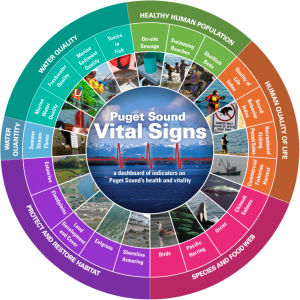You might call it the science of happiness, and some say it is a key to Puget Sound recovery.

Social scientists sometimes refer to it as “human well being”— or “quality of life”— and it is one of the Puget Sound Partnership’s vital signs for a healthy Puget Sound.
PSI’s Kelly Biedenweg is the lead social scientist working with the Partnership to craft a series of indicators to quantify some of the ways that Puget Sound, quite simply, makes our lives better, and how our well being in turn influences the way we interact with the Sound.
According to the Partnership, “A healthy Puget Sound includes a thriving natural world, a vibrant economy, and a high quality of life for people.” But how do you measure something so seemingly intangible? Biedenweg recognizes that happiness and quality of life can be subjective, and in her studies, she has worked with many different cultures in search of common principles that scale across cultures and regions.
Her studies emphasize our relationship to natural resources, and are taking her around the world. She recently returned from New Zealand, where she met with members of the Maori tribe to learn about methods to measure well being associated with rivers. In October, she will visit Bhutan, known for its Gross National Happiness Index, to attend the annual Meeting of Practitioners and Scholars on Happiness. In the spring, Biedenweg worked with members of the Quinault nation to develop case studies to understand the importance of salmon to tribal well being.
“We feel that what we are learning is that values are similar for most populations,” says Biedenweg, who seeks to translate what she is finding in small scale studies to the larger Puget Sound region. “We want to measure and understand human well being so we can aim for it and so we can understand how it influences ecosystem health,” she says.
So far, she has been “ground truthing” seven categories for measuring human well being: psychology (emotional), social, spiritual, cultural, physical, economic and government. She has been testing methods of quantifying these categories as indicators and expects to bring her findings to a Puget Sound-wide workshop in late fall or early winter.
Biedenweg points out that understanding how people relate to Puget Sound’s natural environment is an important piece of the puzzle as the Partnership develops its recovery strategies. People tend to engage more in positive, less destructive behaviors when they feel that they are receiving a benefit, she says.